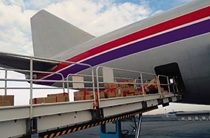Air industry warns of mail cargo capacity shortage
Crunch is caused by combination of canceled passenger flights, spike in online orders, IATA and UPU say.

Air cargo capacity for postal services is facing a coronavirus crunch, after being hit with the one-two punch of widely canceled passenger flights—frequently used to carry mail cargo in the belly hold—and a spike in online shopping orders, two industry groups are warning today.
To address the shortage, governments should do more to support the movement of mail by air during the Covid-19 crisis, according to a joint statement by the International Air Transport Association (IATA), and the Universal Postal Union (UPU). UPU is a United Nations specialized agency and the primary forum for cooperation between postal sector players in its 192 member countries.
The capacity crunch is in line with IATA’s cargo statistics for March, which showed that pandemic conditions have triggered global air cargo capacity to fall by nearly 23% compared to the year-earlier period.
According to the groups, three specific government actions that could help ease the mail bottleneck include: removing border blockages to ensure trade flows continue; avoiding unnecessary regulations; and fast-tracking the issuance of permits for chartered operations, they said. In addition, they called for the increased hiring of “adequately trained” staff to process and clear mail upon arrival.
Consumers may notice that the shortage is particularly acute for the delivery of international mail, and specifically, cross-continental mail, the groups said. The cause is due to a “drastic” 95% reduction in passenger flights and a concurrent 25-30% increase in demand for e-commerce as customers and businesses resort to online purchasing in response to social distancing restrictions, they said.
“Posts are trusted partners in the delivery of goods, vital medical supplies, and essential information on the pandemic,” UPU Director General Bishar A. Hussein said in a release. “The cancellation of more than 4.5 million passenger flights – the primary means of transporting post - has meant that capacity is scarce, costs more and takes longer. Action needs to be swiftly taken to address the shortfall in air cargo capacity and to keep the mail moving.”
.@IATA & #UPU_UN warn of Air Capacity Shortage https://t.co/zLUxTYt4hT #COVID19 #coronavirus @UN_News_Centre @PostalHubPod @UN_UniteIdeas @JPForceville @PostEurop @UN @Mm_Bahrami @Union_UPAEP @icao @isaacgnamba #aircargo #StrongerTogether pic.twitter.com/MetWrBzaTi
— UniversalPostalUnion (@UPU_UN) May 4, 2020
Related Articles
Copyright ©2024. All Rights ReservedDesign, CMS, Hosting & Web Development :: ePublishing